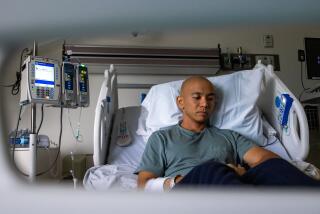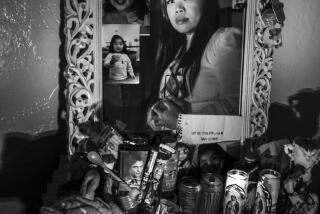Teen Who Underwent Botched Heart-Lung Transplant Dies
- Share via
Jesica Santillan’s long and arduous journey from Mexico to the United States for a new heart and lungs ended in futility Saturday when she died at Duke University Hospital, a victim of a transplant surgeon’s fatal error.
Physicians at the Durham, N.C., hospital, who had mistakenly transplanted organs with an incompatible blood type, declared Jesica brain-dead at 10:25 a.m. PST and removed her from life support machinery about 2 p.m. PST, hospital spokesman Richard Puff said. They had determined that no blood was reaching her brain and that her brain cells were exhibiting no activity.
Jesica’s convoluted and controversial story took on another layer of intrigue Saturday because of the possibility that Duke physicians removed her from life support without her parents’ permission -- a legal but perhaps morally questionable decision.
Santillan family lawyer Kurt Dixon said early Saturday that the family would seek a second opinion from an outside physician about her chances of recovery before taking the irrevocable step of removing her from life support. It is not clear that they were able to bring in an outside doctor or that hospital officials would wait for such a consultation.
Puff said he did not know whether doctors had the family’s permission to turn off the life support equipment.
“The family of Jesica Santillan and the family of Mack Mahoney are obviously devastated by this tragic turn of events,” Dixon said. Mahoney, a 55-year-old contractor in the Durham area, was Jesica’s chief fund-raiser.
Dixon said the family and its supporters would have no further comment on the case for now.
“All of us at Duke University Hospital are deeply saddened by this,” said Dr. William J. Fulkerson, the hospital’s chief executive. “We want Jesica’s family and supporters to know that we share their loss and their grief. We very much regret these tragic circumstances.”
Jesica was born with a heart defect that did not allow her blood to carry enough oxygen to the rest of her body.
Because the required transplant was not available in Mexico, her family saved money for more than a year to pay a smuggler to bring them into the United States for treatment. They chose Duke because of its excellent reputation as a transplant center and because it is one of the few hospitals that perform combined heart-lung transplants.
Mahoney was so moved when he read a story about the 5-foot-2-inch, 80-pound girl living in a trailer that he organized a charity called Jesica’s Hope Chest and spearheaded the drive to raise the $500,000 to pay for the procedure. Among other things, he donated his time to build homes using donated materials and then sold them, with all the profits going to the foundation.
Jesica waited three years until an apparently suitable set of organs became available Feb. 7. The long wait occurred because of Jesica’s size: New organs had to be obtained from a child to be small enough to fit.
But Dr. James Jaggers had no sooner completed the long-anticipated procedure when it became clear that Jesica’s body was rejecting the donor organs.
The transplant team quickly learned that they had implanted organs from a donor with type A blood into Jesica, who had type O-positive blood -- a glaring error in transplants because such a mismatch provokes a strong immune reaction. A subsequent investigation revealed that Jaggers and others failed to confirm the compatibility of the donated organs before the surgery began.
Jesica was kept on life support most of the time while surgeons searched frantically for another set of organs.
Thirteen days later, they found a set, and the heart and lungs were implanted Thursday morning. The Duke team used procedures developed after the first debacle to ensure that the new organs were a proper match, but their safety procedures proved to be a case of closing the barn door after the horse had escaped.
That night it was apparent that although the newly implanted organs were working perfectly, Jesica was suffering from swelling and bleeding in her brain.
Experts said the damage most likely resulted from the long time she spent connected to life support machinery.
Friday, physicians said the damage was most likely irreversible. Mahoney was incensed. In an emotionally charged news conference Friday, he said, “If she dies, they will have murdered her.”
By Saturday, physicians could detect no brain activity whatsoever and Jesica was declared brain-dead.
“As Jesica’s surgeon, I am ultimately responsible for this team and this error,” Jaggers said in a statement released Saturday afternoon.
“I personally told the Santillan family about the errors that were made and then tried to do everything medically possible to treat Jesica and save her life.... We put our all into what was, unfortunately, a losing battle.”
The family has retained a local medical malpractice attorney, but Dixon said they have not yet decided whether they would go to court over the original botched procedure.
More to Read
Sign up for Essential California
The most important California stories and recommendations in your inbox every morning.
You may occasionally receive promotional content from the Los Angeles Times.













